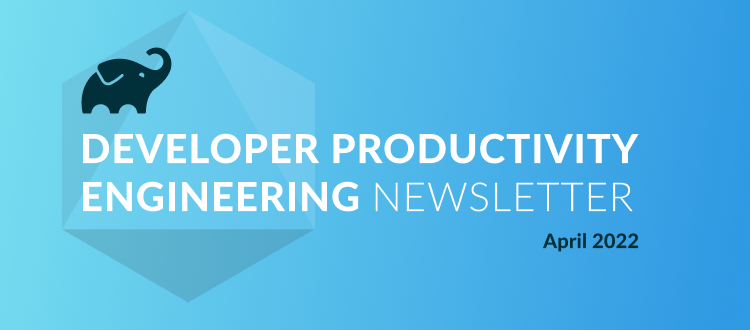
Featured Upcoming Event
The hit series is now in its second season, and we
are excited about the upcoming season premiere on
April 20 (10:00 AM - 10:30 AM PDT). In this
episode, Android gurus from some of the most
famous technology and global business brands will
weigh in on thought-provoking technology choices
they support or interesting practices they
recommend to scale their Android developer
experience. They include Emma Tresanszki (JP
Morgan Chase), Heath Borders (Amazon Twitch),
Daniel Duval (Delta Airlines), and Joshua Fenemore
(Kaiser Permanente).
Not familiar with DevProdEng Showdown? It’s a
series of live-streamed 30-minute episodes where a
panel of distinguished experts debate hot topics
related to Developer Productivity Engineering in a
rapid-fire game show format and you get to decide
the winner. Check out our
pilot episode
to get a better idea of what you’re in for and
don’t forget to invite your colleagues that care
about DevX.

Ideas & Insights
In a recent blog, Roberto Perez Alcolea of the
Netflix JVM Ecosystem team shared some of his
team’s use cases and best practices for using
Gradle Enterprise to manage Gradle plugins in
their builds. Roberto’s team also leads the Nebula
project, a set of Gradle plugins that eliminate
boilerplate build logic and provide sane
conventions for simplifying build
scripts.
Roberto’s team manages all of Netflix’s open
source Gradle plugins for Netflix internally as
well as for the external Nebula community.
Tracking how well plugins work or how they’re used
by thousands of developers isn’t an easy task. The
Nebula team uses Gradle Enterprise to (1) see how
well those plugins are working and performing for
their developers and (2) troubleshoot them more
easily when things go wrong. This blog covers
seven specific ways Roberto’s team uses Gradle
Enterprise to better manage plug-in performance
and maintenance.

Expert Takes
In the “Developer Productivity Engineering
Handbook—A Complete Guide to Developer
Productivity Engineering for Practitioners,” DPE
experts share techniques and stories about
how to:
-
Understand the importance of fast feedback
cycles and early discovery of bugs
-
Quantify the costs of low-productivity
development environments that waste time waiting
for slow builds, tests, and CI/CD pipelines
-
Organize the data required to understand,
troubleshoot, and improve essential development
processes like builds, tests, and CI/CD
pipelines
-
Take advantage of acceleration technologies like
caching and test distribution to speed up
feedback cycles
-
Use data proactively to improve the reliability
of the development toolchain
-
Find and eliminate frequent errors and noisy
signals like flaky tests
The DPE Handbook can help you reach your goals no
matter who you are:
-
A Senior Software Developer responsible for the productivity and morale of
their teams
-
A Build Engineer responsible
for enabling fast and frequent software
delivery, improving trust and confidence in the
toolchain, and making collaboration with the
development team more efficient
-
A DPE Manager looking for a
comprehensive guide to the DPE practice that
they can reference, share, and use to socialize
the key concepts and tools across the
organization
-
Engineering Leadership open to
new strategies to decrease time-to-market and
minimize code while maintaining and improving
quality

Technology NEWS
The new Gradle Enterprise REST API is a new
foundation for interacting with Gradle Enterprise
programmatically. It is defined via the OpenAPI
standard and comes with sample code for data
models and client applications. You can use
the API to discover historical builds, extract
basic build attributes from Gradle and Maven
builds (e.g. build duration, project name, user,
hostname, tags), and extract key build caching
performance metrics (e.g. cache hit ratio,
estimated time savings).
For a quick start, an example sample project is
provided that exports build cache performance
metrics from Gradle Enterprise to another system,
such as a dedicated data warehouse or an analysis
and reporting tool like Tableau. You can also use
it to register and configure build cache nodes.
More resources and operations will be added over
time, particularly resources that describe aspects
of builds in an easy-to-process data model. For
more information, including the API specification,
please see the new Gradle Enterprise API manual.

INDUSTRY NEWS
In a recent blog, the Micronaut Foundation
announced the establishment of a new partnership
program to recognize the companies whose
contributions enable them to maintain and expand
both the open-source technologies and the assets
they rely on to keep our mutual communities
informed and engaged.
The Foundation recently announced Gradle Inc. is
the first Tools and Infrastructure Partner. In
support of the organizations’ shared values and
goals within the open-source ecosystem, Gradle
provides the foundation free instances of Gradle
Enterprise and has helped the team improve build
times and test-feedback cycle times and
troubleshooting efficiency by combining root-cause
analysis data with failure analytics.
|
